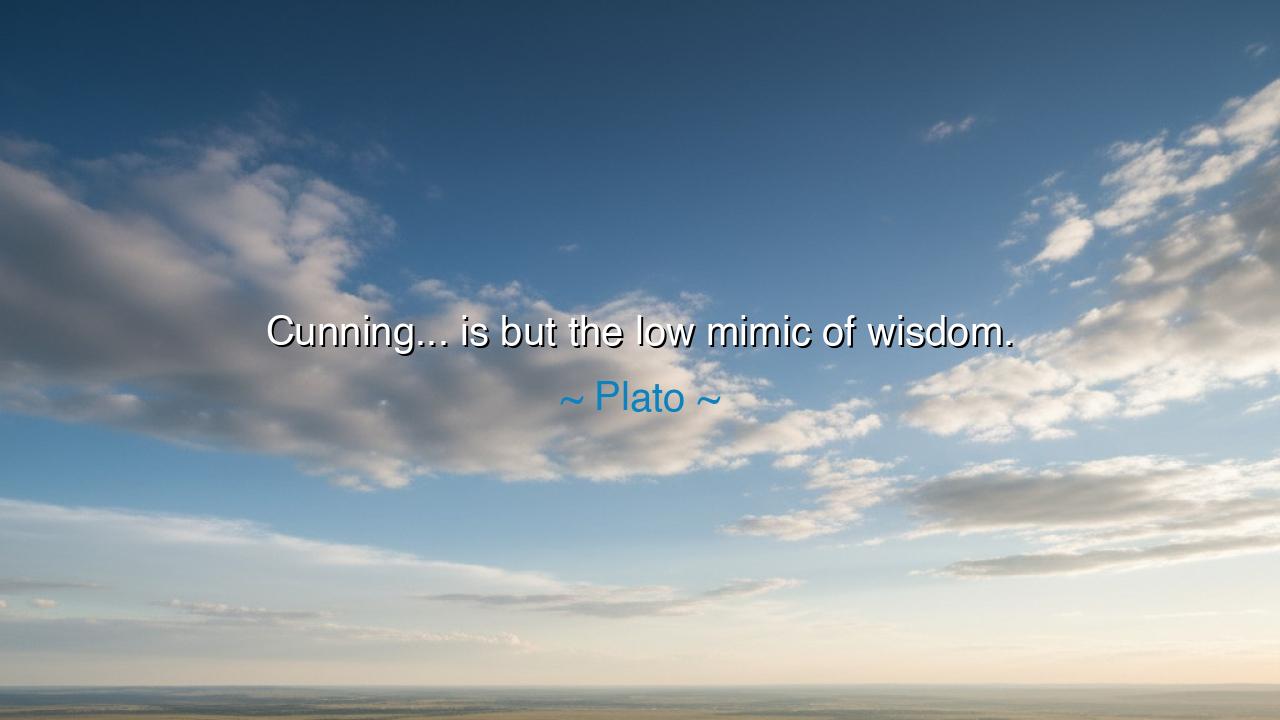
Cunning... is but the low mimic of wisdom.






Hearken, O children of discernment, to the piercing words of Plato, who distinguishes the shining path of wisdom from the shadowed guise of cunning. He declares that cunning is but the low mimic of true understanding, a hollow imitation that seeks advantage without virtue, and cleverness without depth. Herein lies a teaching for the ages: the intellect that serves only self-interest and deception may achieve temporary gain, but it falls short of the enduring clarity, virtue, and insight that define genuine wisdom.
The origin of this reflection lies in Plato’s life as philosopher and teacher of the human soul, whose dialogues explored the nature of knowledge, virtue, and justice. In the world of men and states, he observed that many pursue cleverness to manipulate, to win favor, or to evade consequence, yet such stratagems lack the moral and rational foundation of true wisdom. Plato reminds us that the imitation, no matter how artful, cannot surpass the authenticity of understanding guided by reason and virtue.
The meaning of this aphorism is profound: cleverness, deceit, or manipulative skill may appear formidable, but it is merely a shadow when measured against the full light of wisdom. True understanding integrates reason, ethics, and foresight, whereas cunning relies on superficial advantage and short-term gain. Plato teaches that the soul’s ascent requires the pursuit of wisdom in its purest form, lest one be ensnared by illusions of intelligence that lack moral weight.
History provides vivid testimony to this truth. Consider Niccolò Machiavelli, whose treatises on political strategy have often been interpreted as a celebration of cunning. Though clever in insight and practical maneuvering, the absence of moral grounding in his prescriptions illustrates Plato’s warning: cunning may secure fleeting victories, yet it cannot achieve the enduring stability, justice, or honor that wisdom brings to leaders and nations.
Moreover, this teaching extends beyond rulers and philosophers to all who navigate the affairs of life. The merchant who seeks gain through deceit, the scholar who manipulates truths for advantage, and the friend who schemes for self-interest—all exemplify the mimicry Plato condemns. True power and fulfillment, he reminds us, emerge only when skill is married to virtue, insight, and the enduring principles of wisdom.
O generations yet unborn, take this counsel into your hearts: cultivate the deep understanding that transcends mere cleverness, and shun the hollow triumphs of cunning. For imitation may deceive the eyes of men, but only genuine wisdom illuminates the soul, guides action, and endures across the ages as a beacon of reason, virtue, and eternal insight.






TThao
This quote makes me think about how we often celebrate cleverness or quick thinking, but true wisdom requires patience, humility, and the ability to see the bigger picture. I wonder if we undervalue wisdom in favor of more immediate, flashy traits like cunning. Do you think that cunning people are often more successful in the short term, even if they fall short of true wisdom in the long run? Is wisdom undervalued in a world that often prizes results over process?
GDGold D.dragon
I love this distinction that Plato draws between cunning and wisdom. It seems to suggest that while cunning might achieve immediate success, it lacks the integrity and long-term value of wisdom. But can we truly separate the two? Sometimes what appears to be cunning may be part of a larger strategy grounded in wisdom. How do we ensure that our cleverness doesn’t slip into manipulation or deceit? Can wisdom ever be misused to justify cunning behavior?
BTBakiu Tran
Plato’s statement feels like a reminder that wisdom isn’t just about getting what you want, but understanding the deeper truths of life. Cunning may allow us to outsmart others or navigate situations cleverly, but it lacks the moral and ethical foundation that wisdom provides. Do you think this distinction still holds true today, or has the line between the two traits become blurred in modern society, especially in the age of social media and manipulation?
KNKhanhchi Nguyen
This quote seems to draw a clear line between wisdom and manipulation, highlighting that cunning may achieve results, but it’s ultimately a shallow imitation of wisdom. It makes me wonder, though: is there ever a situation where cunning could be justified? For example, in survival situations, is using wit and strategy to outsmart opponents necessarily a bad thing, or does it always fall short compared to true wisdom?
GKpham gia khiem
Plato’s idea that cunning is just a low mimic of wisdom really makes me think about how we often confuse cleverness with true insight. Cunning can sometimes get us what we want in the short term, but wisdom requires a deeper understanding of the world and the consequences of our actions. Is it possible to have one without the other, or do they inevitably complement each other? Can cunning ever be a valuable trait, or is it always a sign of weakness in the face of true wisdom?